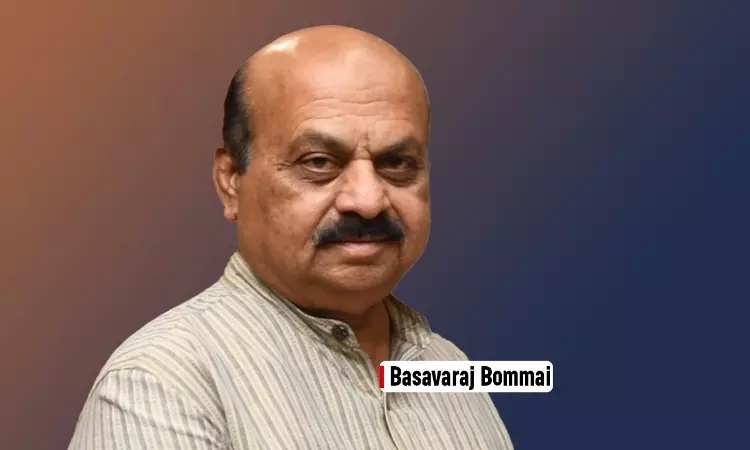In a major legal development, the Karnataka High Court has quashed two criminal cases filed against BJP leader and former Chief Minister Basavaraj Bommai. The cases, which accused Bommai of hate speech and promoting enmity between religious groups over his remarks about the Waqf Board and land encroachment, have been dismissed on grounds of vagueness and lack of legal merit. This verdict, delivered by Justice SR Krishna Kumar, is being seen as a significant victory for Bommai and has sparked widespread debate across Karnataka’s political and legal circles.
The Karnataka High Court’s decision to quash the cases against Basavaraj Bommai is expected to have a ripple effect on how hate speech allegations are handled in the state. Legal experts point out that the court’s insistence on concrete evidence and clear legal grounds will likely deter the filing of vague or politically motivated complaints in the future. This could reduce the burden on the judiciary and law enforcement, allowing them to focus on cases with substantive merit and genuine threats to public order. At the same time, it places a greater responsibility on complainants to ensure their allegations are well-founded and supported by specific facts.
For Bommai and his supporters, the verdict is more than just a legal victory—it is a reaffirmation of their right to political expression. The former Chief Minister has publicly stated that his remarks were made in the context of a democratic protest and were never intended to incite hatred or violence. He has called for a more nuanced understanding of political speech, arguing that robust debate and criticism are essential components of a healthy democracy. The court’s ruling, in his view, upholds these democratic values and protects leaders from being unfairly targeted for their opinions.
However, the judgment has also reignited debate about the boundaries of free speech, especially for public figures. Critics argue that politicians wield significant influence and must exercise caution in their statements to avoid inflaming communal tensions. They contend that legal safeguards against hate speech are necessary to maintain social harmony and protect vulnerable communities. The Bommai case, they say, should not be seen as a license for reckless rhetoric but as a reminder of the need for responsible leadership.
1. Karnataka High Court and Basavaraj Bommai: The Origin of the Cases
The controversy began in November 2024, when Basavaraj Bommai, during a BJP protest rally, made statements criticizing the Waqf Board and the Congress-led Karnataka government. Bommai alleged that the Waqf Board was encroaching on farmers’ and temples’ properties, famously saying, “If a stone is thrown in Savanur, wherever it falls, it is Waqf land.” These remarks, perceived as inflammatory by some, led to two criminal complaints against him under Section 196(1)(a) of the Bharatiya Nyaya Sanhita (BNS), 2023, which pertains to promoting enmity between different groups on religious or other grounds.
The cases were registered by Shiggaon police, and the complaints cited Bommai’s remarks as an attempt to incite disharmony and target a particular community. The Waqf Board’s actions, including notices to over 400 farmers in Vijayapura district regarding alleged encroachment on 14,000 acres of waqf land, had already created a tense atmosphere, and Bommai’s comments further fueled public debate.
)
)
2. Karnataka High Court and Basavaraj Bommai: Legal Arguments and Court Proceedings
Basavaraj Bommai challenged the cases through two separate petitions, arguing that the complaints were frivolous, politically motivated, and lacked the necessary legal ingredients to sustain charges under Section 196(1)(a). He was represented by Senior Advocate Prabhuling K Navadgi, while the state was represented by Additional Special Public Prosecutor BN Jagadeesha, who contended that video evidence of Bommai’s speech prima facie suggested an offence.
Justice SR Krishna Kumar, after reviewing the complaints, video evidence, and relevant legal precedents, concluded that the allegations were “vague, bald, omnibus, and laconic.” The court observed that continuing the proceedings would amount to an “abuse of process of law” and quashed both cases. Importantly, the court clarified that this relief is limited to Bommai and does not apply to others named in the FIR.
3. Karnataka High Court and Basavaraj Bommai: Political and Social Reactions
The High Court’s decision has generated strong reactions from political parties, legal experts, and community leaders. Supporters of Bommai and the BJP have hailed the verdict as a vindication of free speech and a blow against what they describe as politically motivated cases. They argue that Bommai’s remarks were made in the context of a legitimate protest and reflect broader concerns about land rights and government actions.
On the other hand, critics and some community organizations have expressed disappointment, arguing that such statements by public figures can inflame tensions and undermine social harmony. They call for stricter standards of accountability for political leaders and urge the judiciary to consider the broader impact of hate speech on society.
4. Karnataka High Court and Basavaraj Bommai: Legal Significance and Precedent
This verdict is being closely studied by legal scholars and practitioners, as it sets a precedent for how courts interpret the requirements for prosecuting hate speech and promoting enmity under the new Bharatiya Nyaya Sanhita. The judgment underscores the need for specificity and substantive evidence in criminal complaints, warning against vague or omnibus allegations that do not meet the legal threshold.
The court’s reasoning also highlights the importance of balancing free speech with the need to protect communal harmony. By restricting the relief to Bommai alone, the court has left open the possibility of proceedings against other accused, depending on the evidence presented.
Impact on Karnataka’s Political Landscape
The High Court’s decision comes at a time of heightened political activity in Karnataka, with land rights, religious issues, and governance under intense public scrutiny. Bommai, a prominent BJP leader and former Chief Minister, remains a key figure in state politics. The quashing of these cases is likely to bolster his standing within the party and among supporters, while also fueling further debate over the use of criminal law in political disputes.
Opposition parties have criticized the verdict, calling for greater vigilance against divisive rhetoric and demanding that leaders exercise restraint in their public statements. The Congress-led state government, which has faced criticism over its handling of Waqf Board matters, has reiterated its commitment to upholding the law and maintaining communal harmony.
Broader Legal Context: Recent High Court Actions
The Karnataka High Court has been at the center of several high-profile cases in recent months, reflecting its pivotal role in shaping the state’s legal and political environment. From rulings on medical negligence to environmental concerns and bail petitions in sensitive cases, the court’s decisions are closely watched and often set important precedents.
The Bommai verdict adds to this legacy, highlighting the judiciary’s responsibility to ensure that criminal law is not misused for political or personal vendettas. Legal analysts expect the judgment to be cited in future cases involving allegations of hate speech and public order.

Community and Civil Society Perspectives
Civil society organizations and community leaders have called for constructive dialogue and greater efforts to address the underlying issues that fuel social tensions. They emphasize the importance of legal clarity, responsible leadership, and community engagement in preventing conflicts and promoting inclusive development.
Some groups have also urged the government to review the functioning of boards like the Waqf Board and to ensure transparent, fair processes in land management and dispute resolution. The Bommai case has brought these issues to the forefront, prompting renewed calls for reform and accountability.
Looking Ahead: Legal and Political Ramifications
As Karnataka prepares for upcoming local and state elections, the High Court’s verdict is likely to remain a topic of discussion. Political leaders across parties are expected to tread carefully in their public statements, mindful of the legal standards set by the court. The case also serves as a reminder of the judiciary’s crucial role in safeguarding democratic values and preventing the misuse of legal provisions for political gain.
Conclusion: A Defining Moment for Law and Politics in Karnataka
The Karnataka High Court’s decision to quash the hate speech cases against Basavaraj Bommai marks a defining moment in the intersection of law, politics, and free speech in the state. By insisting on legal precision and substantive evidence, the court has reinforced the principles of justice and due process. As the political and legal landscapes continue to evolve, the implications of this verdict will be felt far beyond the courtroom, shaping debates on leadership, accountability, and the rule of law in Karnataka.
Within Karnataka’s legal community, the verdict is being analyzed for its implications on future cases involving Section 196(1)(a) of the Bharatiya Nyaya Sanhita. Lawyers note that the judgment clarifies the evidentiary standards required for prosecuting hate speech, emphasizing the need for specificity, context, and intent. This could influence how police and prosecutors investigate and frame charges in similar cases, potentially leading to more rigorous scrutiny before cases are brought to court.
The political ramifications of the High Court’s decision are already being felt across party lines. BJP leaders have rallied around Bommai, portraying the verdict as a triumph over what they describe as attempts to stifle dissent. Meanwhile, opposition parties are using the case to highlight the need for greater accountability and restraint in public discourse. The issue of land rights, Waqf Board governance, and communal relations is likely to remain a contentious topic in Karnataka’s political landscape, with leaders from all sides seeking to leverage the court’s ruling to their advantage.

Looking ahead, the Bommai verdict is expected to serve as a benchmark for balancing free speech and social responsibility in Karnataka. As the state grapples with complex issues of identity, governance, and development, the judiciary’s role in interpreting and enforcing the law will remain crucial. The case underscores the ongoing challenge of fostering open debate while safeguarding communal harmony—a challenge that will continue to shape Karnataka’s legal and political discourse in the years to come.
Follow: Karnataka Government

